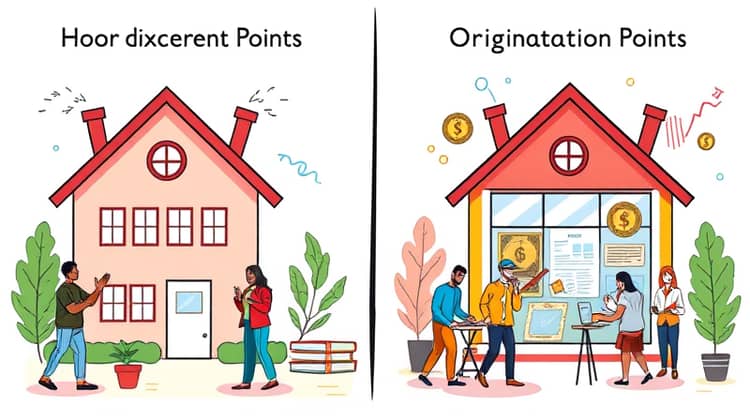Mortgage Points Explained: How to Save on Your Loan Interest Costs

The concept of mortgage points can be confusing for many homeowners. Understanding how they work and how they can affect your overall loan costs is essential in making informed financial decisions. This article delves into mortgage points, their types, and the advantages and disadvantages associated with purchasing them. Armed with this knowledge, you can better determine if buying points is the right decision for your financial situation.
Purchasing a home is often the largest financial decision an individual will make in their lifetime. Securing a favorable mortgage rate is crucial to reducing long-term expenses. Mortgage points can play a significant role in helping borrowers achieve better rates on their loans and ultimately leading to considerable savings over time.
Whether you're a first-time homebuyer or looking to refinance, it's essential to grasp the ins and outs of mortgage points. Through careful consideration, you can decide whether utilizing this tool fits well into your financial strategy. Let's dive deeper into understanding mortgage points.
What are Mortgage Points?

Mortgage points, often referred to as discount points, are fees paid upfront to reduce the interest rate on your mortgage loan. One point is equivalent to 1% of the loan amount. For instance, if you're borrowing $200,000, one point would cost you $2,000.
By purchasing mortgage points, borrowers can lower their monthly payments and decrease their overall interest costs. It is crucial to evaluate the trade-off between upfront costs versus long-term savings to determine if buying points makes sense for you.
Types of Mortgage Points

There are primarily two types of mortgage points: discount points and origination points. Discount points reduce the interest rate, while origination points are fees charged by lenders for processing the loan. Understanding the difference is vital for making informed financial choices.
- Discount Points: Paid to lower the interest rate.
- Origination Points: Charged by the lender for originating the loan.
In many cases, borrowers may also encounter lenders who use a combination of both types of points, making it even more important to understand what you're paying for.
How Do Mortgage Points Work?

When you opt to buy mortgage points, you're essentially prepaying a portion of the interest on the loan. By doing this, your lender rewards you with a lower interest rate for the life of your mortgage. This can lead to significant savings in total interest payments over the loan term, potentially amounting to thousands of dollars.
The savings from reduced interest can make a substantial difference in your monthly payment. For example, reducing your interest rate from 4% to 3.5% could save you hundreds of dollars each month. However, you must weigh these savings against the upfront cash needed to purchase the points.
It's vital to analyze how long you plan to stay in your home and whether the savings you’d see from lowering your rate will outweigh the initial costs involved in purchasing mortgage points.
Advantages of Buying Mortgage Points

Buying mortgage points can have numerous benefits for borrowers, particularly when planning to stay in their homes for a long time. The savings on monthly payments can help with cash flow, making it easier to manage household finances, especially in the years following the purchase.
Additionally, lower interest rates mean that you can build equity in your home faster, as more of each mortgage payment will go toward paying down the principal balance rather than interest. This aspect can significantly enhance your financial position over time.
- Lower monthly payments.
- Reduced overall interest costs.
- Faster equity build-up.
These advantages can be particularly compelling for buyers who are sure of their long-term housing situation and are looking to limit their monthly expenses over time.
Disadvantages of Buying Mortgage Points

While purchasing mortgage points can be beneficial, there are undeniably drawbacks to consider. One significant downside is the upfront cost associated with purchasing points. Paying thousands of dollars upfront can strain a borrower's finances, especially if you're short on cash.
Another consideration is the length of time you plan to stay in your home. If you move or refinance before breakeven on your investment in points, you could end up losing money rather than saving.
- High upfront costs.
- Risk of not breaching break-even point.
- Potential for changing financial goals.
Borrowers must balance these factors carefully to decide whether buying points aligns with their overall financial strategy.
How Much Do Mortgage Points Cost?

The cost of mortgage points can vary significantly based on your lender and the specifics of your loan. Typically, one point equals 1% of the loan amount, but it’s vital to verify this rate with your lender. For instance, if you have a $300,000 mortgage, one point would typically cost $3,000.
It’s also essential to note that generally, the more points you purchase up front, the lower your interest rate will be. However, this also means more money out of pocket initially, so it's key to assess your financial readiness before making such an investment.
Comparing point costs among different lenders can be critical to finding the best deal. Some lenders may offer lower rates that don't require points—balancing initial costs and long-term savings effectively.
When to Consider Buying Mortgage Points

Consider buying mortgage points if you can afford the upfront costs and plan to stay in your home long enough to make the savings worthwhile. If you anticipate living in your home for a longer-term, then purchasing points could help maximize your interest rate savings over time.
- If you are planning on living in the home for several years.
- If you have sufficient cash reserves for upfront costs.
- If you are looking for ways to lower your overall loan costs.
Being proactive in understanding your financial goals and evaluating your living situation can greatly assist in making a more informed decision regarding mortgage points.
How to Decide

Deciding whether to purchase mortgage points requires careful thought and consideration of your current financial situation and long-term objectives. Start by calculating how much you can afford to pay upfront and compare that with your savings on monthly payments.
Next, analyze how long you plan on staying in your home and what the breakeven point would be for your investment in points. If your calculated breakeven point is shorter than the time you plan to stay in your home, it becomes a more attractive option.
Finally, consult with a financial advisor or mortgage professional to help you navigate your choices, as they can provide insights tailored to your specific circumstances.
Conclusion

Purchasing mortgage points is a financial strategy that can yield substantial benefits for the right homeowner. By reducing monthly payments and total interest owed over time, mortgage points can represent a wise investment when used correctly.
However, the associated costs and personal circumstances must be considered. By weighing the pros and cons and understanding your unique financial situation, you can determine if buying mortgage points is an advantageous move for your mortgage strategy.






